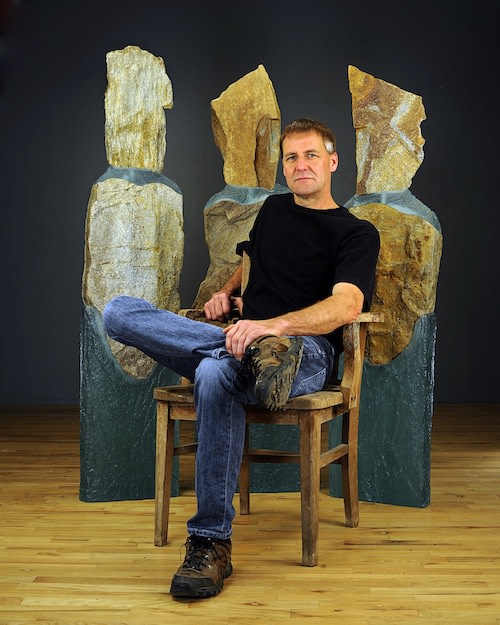Thomas Scoon has been an independent studio artist since 1991, producing astounding sculptural works that focus on the human figure. Scoon's works vary from small scale figures to his recent life-size sculptures. In pairing and grouping figures, he attempts to explore familial and generational relationships, which he hopes speaks to his audience as both personal narrative and universal construct.
He begins his artistic process by selecting stones in natural habitats, which he visits over a period of years to appreciate the evolution of his natural materials. He attempts to gather both the head and the torso stone from the same site for consistency of color and texture. With the use of wax molds, Scoon casts glass to fit the stones and the glass shapes the rest of his figures in a very organic sense, much like ice. The translucent quality of the glass is activated by natural sunlight and in this way, Scoon says, the figures are given their spirit or soul.
"In my work, I create figures from sequences of stone and glass. The figures rise up from the external landscape where I live, a place filled with remnants of stonewalls and glacial erratic. I gather stones from quarry rubble and from New Hampshire neighbors who allow me to choose stone from their land. The glass portions of the sculpture are combined with these found stones, suggesting human figures, I try to choose rocks that evoke the feeling and gesture of human forms, specifically torsos and heads. I will look for a flat rock with a curved edge and tapering form to suggest torsos or the triangulation of stone with a cleft that may hint of a head.
I do very little to alter these stones in the process of making sculptures, perhaps chiseling or cutting a bit, instead I seek to emphasize qualities already naturally present. The layering of kiln-cast glass with the stone allows light to pass through the figures and what I hope, embodies the spiritual and physical essence of human nature into the sculpture. By marrying fire and materials of earth with a modern process of casting glass, there is a fusion of composition and chance.
Given the range of scale and opportunity to group figures together, there are layers of interpersonal drama, gender, and generational concerns. The combination of materials expresses both the fragility and enduring qualities of humanity. I believe the figures are universal in that they speak directly to what is elemental rather than superficial about us and our relationships to others. These qualities of spirit are nearly indefinable, of what we share in our immediate lives as well as through a common human history but it is what I want to capture in some small measure."
Thomas Scoon's work is highly collected around the world not least by the Glassmuseum, Ebeltoft in Denmark and the permanent collection at the Detroit Institute of Arts, Robinson Collection and Chordorkoff Collection.
